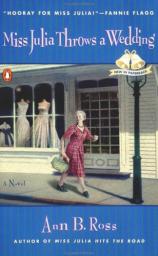Reading Group Guide
Discussion Questions
Miss Julia Throws a Wedding

1. Pastor Petree is reluctant to marry Binkie and Coleman without first counseling the couple about marriage. Do you, along with Miss Julia, agree that the young pastor has no business passing judgment as to whether the marriage is "within God's will" or do you think that, as a religious authority, the Pastor is a de facto representative of what constitutes a worthy marriage in the eyes of God and the church?
2. Miss Julia tells Binkie, "A bride deserves a big church wedding, a dress with a long train and bridesmaids and flowers and all your friends celebrating with you. Queen for a day" (p.11). Do you agree? If you are married, compare your wedding day with the one Miss Julia evokes in this passage. What is the down side of being "Queen for a day"?
3. "As far as I was concerned," thinks Miss Julia, "a wedding was supposed to be a ceremonial rite of tradition and high intent. But most of all, it was supposed to be a sedate and formal act, conducted with the utmost seriousness." How does the wedding that does eventually take place differ from this description? Was Miss Julia more help or hindrance in planning the event? Would Binkie and Coleman have been as happy with the small, civil ceremony they had originally planned?
4. How does Ann B. Ross make Little Lloyd's character come to life? Judging from his words and actions in this novel, what kind of adult do you think he'll grow up to be?
5. Ross pokes fun at "prayer chains" in the novel. How does Emma Sue's proclivity for these kinds of groups contradict the idea of prayer itself? If you've ever taken part in a prayer circle, how has your experience been similar to or different from the kind held by Emma Sue?
6. "I declare," says Julia to her friend and sometime beau, Sam, "You are so blessed tolerant that you're going to wake up one morning and find that you don't stand for anything" (p. 95). This is a lighthearted poke at a complaint many people have against liberals. Do you know anyone so tolerant that they don't stand for anything? What's the difference between tolerance and apathy?
7. Does Sam come off as being wishy-washy when it comes to Miss Julia? Do you think they make a good romantic match?
8. Do you agree with Sam when he says, "More lives have been ruined by getting married than by not getting married"? Or do you agree with Miss Julia that Binkie's pregnancy is reason enough to get married, even if neither the bride or groom are certain that marriage is right for them?
9. Before she finally agrees to the wedding, Binkie gives all sorts of reasons for not getting married, including that her life is fine just the way it is. Do you think her reasons were at all valid? Did you ever think that she might decide not to marry Coleman after all?
10. Julia never admits to seeing the image of the Virgin Mary on the wall of the church's new building. Is she the kind of woman to believe in such miracles? How important is it to figure out what really caused the image to appear?
11. How does Ann B. Ross use the apparition on the side of the church's community center to tie together the novel's various stories?
Miss Julia Throws a Wedding
- Publication Date: February 25, 2003
- Paperback: 308 pages
- Publisher: Penguin (Non-Classics)
- ISBN-10: 0142002712
- ISBN-13: 9780142002711








